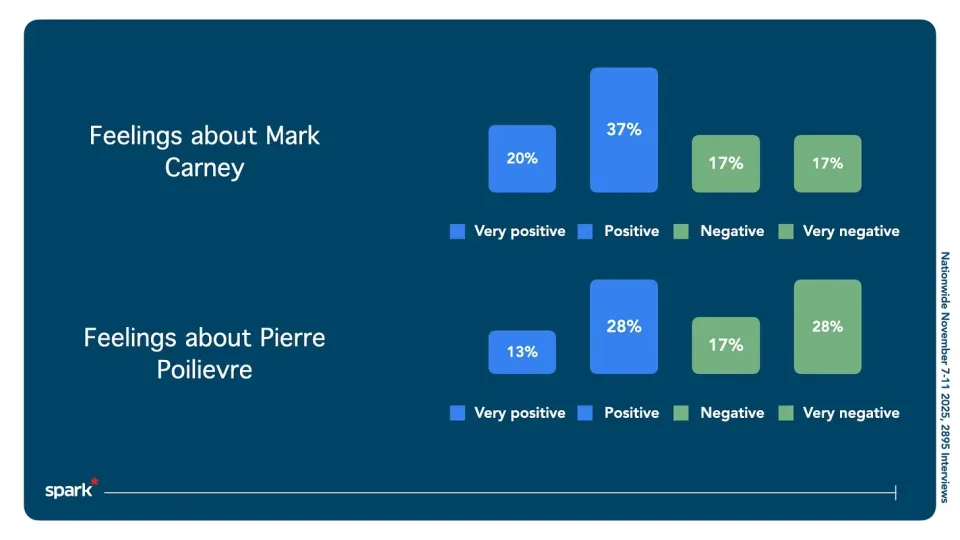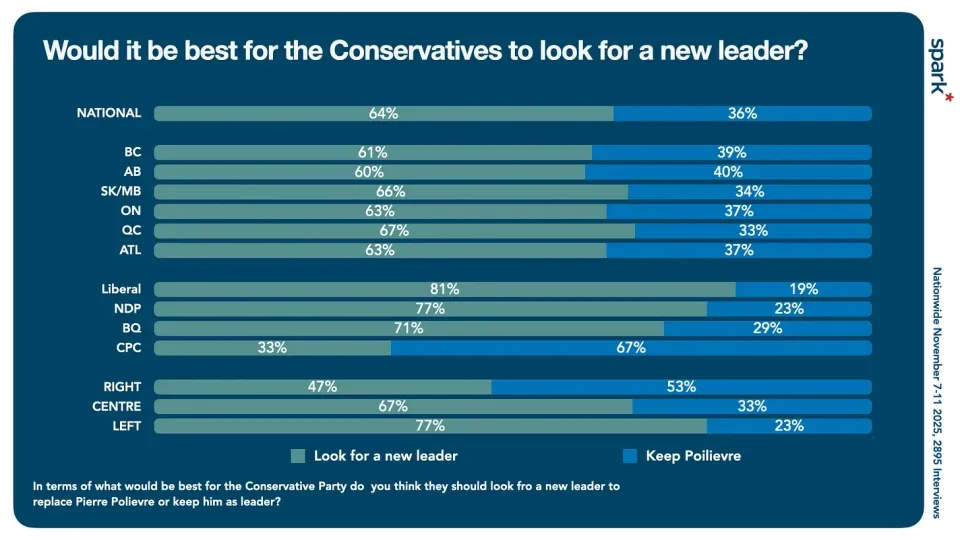Subscribe for more!
Subscribe to our newsletter for insights and articles on wide ranging issues including reputation management, branding, advertising, awareness, advocacy, and communications. You can unsubscribe anytime.
Follow us on social:

Betting on Poilievre is betting that someone who’s been in politics for 20 years will grow more popular, and the odds tell us that only rarely happens.
The list of politicians who gain popularity after 20 years in public life is short. When it happens, it involves a major change in the politician, or a bigger change in the world they are competing in. It can happen, but usually doesn’t.
For Conservatives to bet that Pierre Poilievre is the best choice to lead them into the next election requires them to believe that Poilievre will become competitive with Mark Carney, or that no one could do better.
Poilievre probably had his career season in 2024. His snarl matched the mood of many people. His ‘everything is broken’ felt like the daily experience of too many. His promise to give young people hope met them where they lived, and got them to invest some of their attention in politics again.
The question for Conservatives is whether that 2024 season was his peak.
To answer that, it’s useful to look at why 2024 was such a good year for him. He didn’t become more popular. If anything he alienated more people, he just did it at a slower pace than his main rival, Justin Trudeau.
Trudeau’s scar tissue was normal for someone who’s been a head of state after 10 years. You make choices, you disappoint some. Trudeau’s three election wins are a political success story.
As per our latest polling (Nationwide sample, 2985 adults, online) Poilievre has charmed 41% of the people and turned off 45%. Poilievre managed to create a lot of negative opinion about himself - without having to take the kind of major decisions a political leader takes, decisions that could disappoint people. Some may argue that he built a stronger, firmer base. Others might argue insisted that the spotlight shine on himself (Pierre for PM), and then ignored the evidence that his personality was rubbing people the wrong way. Both things can be true.

Stephen Harper didn’t see Poilievre as Cabinet material after he won the election in 2006. Or after the election of 2008. Or after the election of 2011.
It was only in 2013 that Harper gave Poilievre a Minister of State role.
And it was only in the final months of Harper’s 10 years in office that he gave Poilievre a full Cabinet post. By that time, Harper had cycled through more than 70 other Conservative MPs.
So, doubts about Poilievre didn’t start last week, they’ve been around for a long time.
As the Conservative leader battles to keep a lid on the evident discomfort some of his MPs have with his leadership, it’s not hard to understand why the discomfort is there.
There are credible leadership alternatives on Poilievre’s front bench and some who are outside elected office now. It’s risky to believe in polling that suggests no one could do better than Poilievre. Some of that is little more than a function of name recognition.
I’m reminded of polls I did in 2024, when Mark Carney trailed all of the leadership rivals he ran against and eventually beat by a wide margin. For a while, those snapshots in time suggested he couldn’t beat Pierre Poilievre, such was the hesitation about the Liberal brand after 10 years.
What I would consider were I still a Conservative (I was a Progressive Conservative for a number of years) is this.
When asked in our latest survey what would be best for the Conservative Party, 64% said the party would be better off to change leaders.
This includes 33% of those who are currently planning on voting Conservative and 47% of those who consider their own politics to be “right of centre”. On the centre, where about half of all voters are, two out of three think the Conservatives would be better off with someone new.

Of course, this isn’t necessarily an indication of how that leadership vote within the Party will go in January, but it as indicator that those who will make this choice can’t help but notice.
A healthy level of support for a leader of a party people say they plan on voting for is north of 80%.
There are about 9 weeks until Conservatives decide if they want Poilievre to be their standard bearer. I’ve no doubt that he will win a majority of those votes, and, given his attention to organizing for this outcome, he might well win a giant number.
Anything less than 80% would leave him weakened, and his party destabilized. If the first number is a 7... hell may continue to break loose in Conservative ranks. But one thing seems clear - betting on Poilievre is betting that someone who’s been in politics for 20 years will grow more popular, and the odds tell us that only rarely happens.
The data referenced were gathered online, with a representative sample of 2,895 adults across Canada, between the dates November 7, 2025 and November 11, 2025.
spark*insights is led by Bruce Anderson, one of Canada’s leading and most experienced public opinion researchers. From polling and research to analysis and guidance, we help organizations, uncover the factors driving or influencing public perception to gain valuable insights into the shape and movement of the landscape.